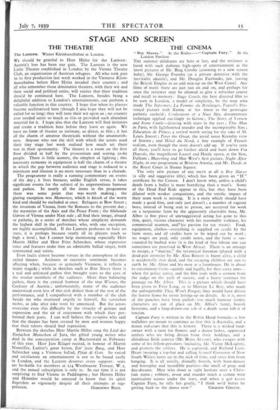THE CINEMA
" Boy Slaves." At the Rialto—" Captain Fury." At the London Pavilion THE summer doldrums are here at last, and the reviewer is faced with such dubious high-spots of entertainment as the latest pictures of Mr. Bing Crosby (crooning to a new screen baby), Mr. George Formby (as a private detective with the inevitable ukulele), and Mr. Douglas Fairbanks, jun. (saving the British Empire in an odd mix-up on the West Coast). Any films of merit there are just run on and on, and perhaps for once the reviewer may be allowed to give a refresher course and recall to memory : Stage Coach, the best directed film to be seen in London, a model of simplicity, by the man who made The Informer; La Femme du Boulanger, Pagnol's Pro- vencal picture with Raimu at his finest as the grotesque pathetic cuckold ; Confessions of a Nazi Spy, documentary technique applied excitingly to fiction ; The Story of Vernon and Irene Castle—dancing with tears in the eyes ; This Man in Paris, with lighthearted murder and the incomparable Sim ; Education de Prince, a revival worth seeing for the sake of M. Louis Jouvet ; Peter the Great, the jovial noisy Kremlin view of history ; and Hotel du Nord, a fine example of French realism, even though the story doesn't add up. If you've seen all these, you'll have to go further afield and hunt down Fra Diavolo, the magnificent Laurel and Hardy opera, at the Star, Fulham ; Mayerling and Mae West's first picture, Night After Night, in one programme at Brixton Astoria, and Mr. Deeds at the Royal Court in Sloane Square.
The only new picture of any merit at all is Boy Slaves (a silly and suggestive title), which has been given an " H " certificate by the Censor. I don't know why, unless a child's death from a bullet is more horrifying than a man's. Some of the Dead End Kids appear in this, but they have been diluted with weaker companions, and the terrific impact of their team work is missing. It is a story which should have made a good film, and only just doesn't ; a number of vagrant boys, instead of being sent to prison, are accepted for work on a turpentine farm by the apparently charitable boss, Mr. Albee (a fine piece of unexaggerated acting has gone to this thin, quiet, vicious character with his reasonable violence, his commercial acumen, and'his passion for toy trains). Food, equipment, clothes—everything is supplied on credit by the farm store, and all credits have to be wiped out by work ; no wages are paid, only credit notes, and the farm is sur- rounded by barbed wire (it is the kind of free labour one can sometimes see practised in West Africa). There is an attempt to escape, a " mutiny," the tyrannical foreman (played with a dead-pan intensity by Mr. Alan Baxter) is burnt alive, a child is accidentally shot dead, and the escaping children are run to
earth by Mr. Albee and his men at a farmhouse. He is about to exterminate them—quietly and legally, for they carry arms—
when the police arrive, and the film ends with a sermon from the judge on the guilt of society, and a heavy sentence for peonage on Mr. Albee. This is a picture which should have been given to Fritz Lang, or to Mervyn Le Roy, who made the unforgettable They Won't Forget; they would have driven the horror home by never letting-up on details. As it is, most of the punches have been pulled—too much humour (comic characters are out of place on Mr. Albee's farm), boyish heroisms, and a long-drawn-out sob of a death scene rob it of tension.
Captain Fury is written to the Robin Hood formula—a few wallabies are meant to convince us that this is Australia, and a dozen red-coats that this is history. There is a wicked land- owner with a taste for flowers and a dozen lashes, oppressed settlers who are being driven from their holdings, and a chivalrous Irish convict (Mr. Brian Aherne), who escapes with some of his fellow-prisoners (including Mr. Victor McLaglen), and protects the settlers. He is captured, and Richard Lion- Heart (wearing a top-hat and calling himself Governor of New South Wales) turns up in the nick of time, and saves him from hanging. It is all noisily, dismally boyish, with barn-dances and horseplay and incredible purities—the smell of prep. and day-dreams. Men who shoot at sight hesitate over a Chris- tian name ; robbery, arson and murder reach a climax witn inarticulate scenes under the stars, and when a girl kisses Captain Fury, he tells her gently, " I think we'd better be getting back to the dance now." GRAHAM GREENE.










































 Previous page
Previous page